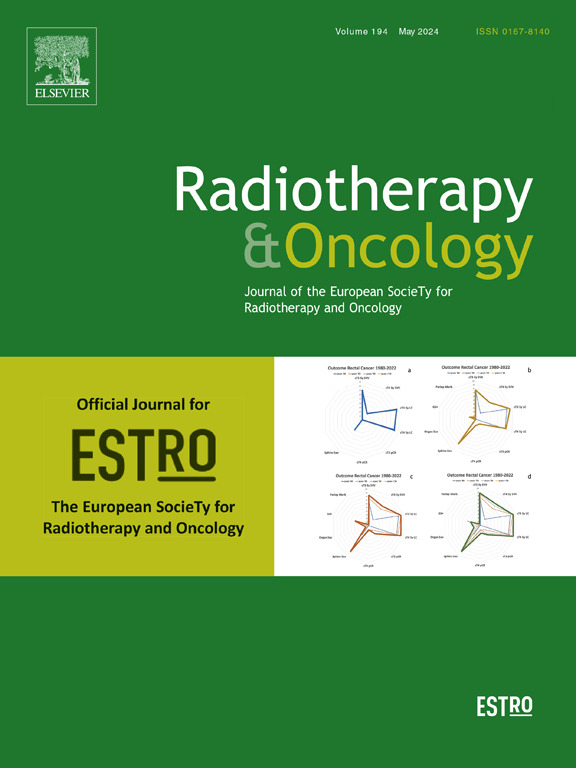Clinical impact of radiotherapy quality assurance results in contemporary cancer trials: a systematic review and meta-analysis
IF 4.9
1区 医学
Q1 ONCOLOGY
引用次数: 0
Abstract
Background
Radiotherapy quality assurance (RTQA) is a critical aspect of randomized controlled trials (RCTs) and is associated with validity and reproducibility of the study findings. We conducted a systematic review and meta-analysis to assess the impact of RTQA results in contemporary RCTs on patient outcomes.
Methods
We searched MEDLINE and CENTRAL from January 2010, to April 2024, for papers that report on the impact of RTQA on patient outcomes in contemporary RCTs. We conducted random-effects meta-analyses to examine the association of radiotherapy protocol deviations with overall survival (OS), progression free survival (PFS), and locoregional recurrence (LR).
Results
Of 2,723 citations, 16 publications reporting on 13 RCTs were included across various disease sites. Of 7,170 total randomized patients across 1,076 institutions in over 25 countries, 5,560 patients had radiotherapy quality data and were included in RTQA analyses. Most included RCTs (7/12; 58 %) conducted exclusively retrospective RTQA after treatment completion. Our meta-analyses found that protocol deviations may be associated with worse OS [HR = 1.65 (95 % CI: 1.23–2.22; p < 0.001)] and PFS [HR = 1.79 (95 % CI: 1.00–3.21; p = 0.03)]. No significant association was demonstrated between protocol deviations and LR [HR = 2.09 (95 % CI: 0.85–5.15; p = 0.108)].
Conclusions
Quality of radiotherapy continues to have an important, measurable impact on patient outcomes in oncology RCTs, and rigorous, real-time RTQA procedures may diminish these effects by standardizing RT. Future trials should provide patient outcome data in relation to RTQA and continue to report on the effect of protocol deviations in the context of modern RT techniques.
当代癌症试验中放疗质量保证结果的临床影响:系统回顾和荟萃分析
放射治疗质量保证(RTQA)是随机对照试验(rct)的一个关键方面,与研究结果的有效性和可重复性有关。我们进行了系统回顾和荟萃分析,以评估当代rct中RTQA结果对患者预后的影响。方法:我们检索了2010年1月至2024年4月期间MEDLINE和CENTRAL数据库中有关RTQA对当代rct患者预后影响的论文。我们进行了随机效应荟萃分析,以检查放疗方案偏差与总生存期(OS)、无进展生存期(PFS)和局部复发(LR)的关系。结果在2723篇引用中,16篇报道13项随机对照试验的出版物被纳入不同疾病部位。在超过25个国家的1076家机构的7170名随机患者中,5560名患者有放疗质量数据,并被纳入RTQA分析。大多数纳入的随机对照试验(7/12;58%)在治疗完成后专门进行回顾性RTQA。我们的荟萃分析发现,方案偏差可能与较差的OS相关[HR = 1.65 (95% CI: 1.23-2.22;p & lt;0.001)]和PFS [HR = 1.79 (95% CI: 1.00-3.21;p = 0.03)]。方案偏差与LR之间无显著关联[HR = 2.09 (95% CI: 0.85-5.15;p = 0.108)]。在肿瘤学随机对照试验中,放疗质量继续对患者预后有重要的、可衡量的影响,严格的、实时的RTQA程序可能会通过标准化放疗来减少这些影响。未来的试验应提供与RTQA相关的患者预后数据,并继续报告在现代放疗技术背景下方案偏差的影响。
本文章由计算机程序翻译,如有差异,请以英文原文为准。
求助全文
约1分钟内获得全文
求助全文
来源期刊

Radiotherapy and Oncology
医学-核医学
CiteScore
10.30
自引率
10.50%
发文量
2445
审稿时长
45 days
期刊介绍:
Radiotherapy and Oncology publishes papers describing original research as well as review articles. It covers areas of interest relating to radiation oncology. This includes: clinical radiotherapy, combined modality treatment, translational studies, epidemiological outcomes, imaging, dosimetry, and radiation therapy planning, experimental work in radiobiology, chemobiology, hyperthermia and tumour biology, as well as data science in radiation oncology and physics aspects relevant to oncology.Papers on more general aspects of interest to the radiation oncologist including chemotherapy, surgery and immunology are also published.
 求助内容:
求助内容: 应助结果提醒方式:
应助结果提醒方式:


